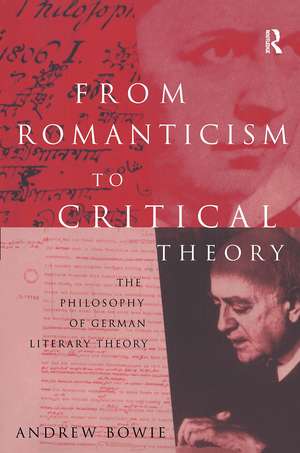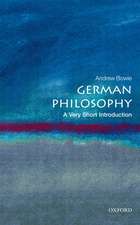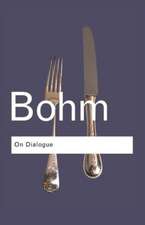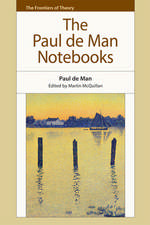From Romanticism to Critical Theory: The Philosophy of German Literary Theory
Autor Andrew Bowieen Limba Engleză Paperback – 14 noi 1996
Andrew Bowie argues, against many current assumptions, that the key aspect of literary theory is not the demonstration of how meaning can be deconstructed, but rather the relevation of how questions of language and literature change modern philosophical conceptions of thruth. He shows how the dialogue between literary theory, hermeneutics and analytical philosophy can profit from a re-examination of the understanding of language, thruth and literature in modern German philosophy.
From Romanticism to Critical Theory will provide a vital new introduction to central theoretical questions for students of philosophy, literature, German studies, cultural and social theory.
| Toate formatele și edițiile | Preț | Express |
|---|---|---|
| Paperback (1) | 350.28 lei 3-5 săpt. | +27.01 lei 5-11 zile |
| Taylor & Francis – 14 noi 1996 | 350.28 lei 3-5 săpt. | +27.01 lei 5-11 zile |
| Hardback (1) | 1000.27 lei 6-8 săpt. | |
| Taylor & Francis – 14 noi 1996 | 1000.27 lei 6-8 săpt. |
Preț: 350.28 lei
Nou
Puncte Express: 525
Preț estimativ în valută:
67.05€ • 72.85$ • 56.36£
67.05€ • 72.85$ • 56.36£
Carte disponibilă
Livrare economică 31 martie-14 aprilie
Livrare express 15-21 martie pentru 37.00 lei
Preluare comenzi: 021 569.72.76
Specificații
ISBN-13: 9780415127639
ISBN-10: 0415127637
Pagini: 368
Dimensiuni: 156 x 234 x 23 mm
Greutate: 0.57 kg
Ediția:1
Editura: Taylor & Francis
Colecția Routledge
Locul publicării:Oxford, United Kingdom
ISBN-10: 0415127637
Pagini: 368
Dimensiuni: 156 x 234 x 23 mm
Greutate: 0.57 kg
Ediția:1
Editura: Taylor & Francis
Colecția Routledge
Locul publicării:Oxford, United Kingdom
Public țintă
UndergraduateRecenzii
`Bowie argues brilliantly and persuasively for the continued relevance of the romantic project for contemporary thought...in the past few years I have found few books that display such a sovereignty with regard to the most difficult philosophical and aesthetic issues of the past two centuries.' - Robert Holub, University of California, Berkeley
`Bowie's study is an impressive and thoughtful contribution to an important debate...he provides a rich intellectual context for the understanding of modern and postmodern culture in general and of recent critical theory in particular' - Martin Swales, University College, London
'Bowie manages to tease out insights from the thinkers he discusses with remarkable dexterity,' - Austin Harrington, Radical Philosophy
'Bowie's splendid book ... remains at all times demanding, intelligible and highly readable ... immensely impressive ... the book is certain to be referred to for a long time to come and should be acquired by all university libraries.' - BARS Bulletin and Review
'This is an essential contribution to Romantic studies, and one that should set the terms of the debate for many years to come.' - Romanticism
`Bowie's study is an impressive and thoughtful contribution to an important debate...he provides a rich intellectual context for the understanding of modern and postmodern culture in general and of recent critical theory in particular' - Martin Swales, University College, London
'Bowie manages to tease out insights from the thinkers he discusses with remarkable dexterity,' - Austin Harrington, Radical Philosophy
'Bowie's splendid book ... remains at all times demanding, intelligible and highly readable ... immensely impressive ... the book is certain to be referred to for a long time to come and should be acquired by all university libraries.' - BARS Bulletin and Review
'This is an essential contribution to Romantic studies, and one that should set the terms of the debate for many years to come.' - Romanticism
Cuprins
Preface and acknowledgements; Introduction, Andrew Bowie; Chapter 1 Philosophical origins, Andrew Bowie; Chapter 2 Shifting the ground, Andrew Bowie; Chapter 3 The philosophy of critique and the critique of philosophy, Andrew Bowie; Chapter 4 Interpretative reasons, Andrew Bowie; Chapter 5 The ethics of interpretation, Andrew Bowie; Chapter 6 Being true, Andrew Bowie; Chapter 7 The truth of art, Andrew Bowie; Chapter 8 Understanding Walter Benjamin, Andrew Bowie; Chapter 9 The culture of truth, Andrew Bowie; Chapter 102 Conclusion, Andrew Bowie;
Notă biografică
Andrew Bowie is Professor of European Philosophy at Anglia Polytechnic University in Cambridge. He is the author of Aesthetics and Subjectivity: From Kant to Nietzsche and Schelling and Modern European Philosophy.
Descriere
This study offers a new view of literary theory as an essential part of modern philosophy and contests the view that it is a product of deconstruction.












